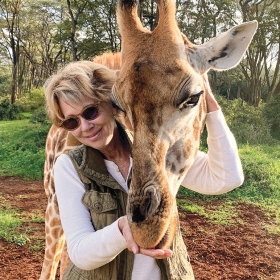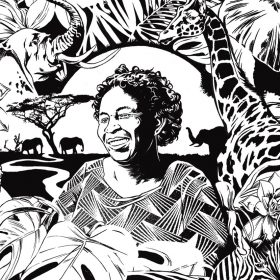Susan Reno Myers ’74
Susan Reno Myers ’74 brings unique energy to everything she does, whether it’s international finance, high school football coaching, or saving endangered giraffes.

Her story, perhaps, is one of perseverance. Or the importance of following where your interests lead. Or trying new things no matter what your age. Or maybe it’s all of those things, with just a little of the unique energy Susan Reno Myers ’74 brings to everything she does, whether it’s international finance, high school football, or giraffe conservation.
Susan was a French major at Wellesley, with interests in business and international affairs. “All my friends were majoring in economics, but I realized I wasn’t ever going to be that good at economics, so I majored in French,” she says, laughing. “I thought by doing that, I’ll have a language, so that will help me no matter what area I want to get into.” After Wellesley, she applied to various graduate programs, including Harvard Business School, which initially rejected her. She kept at it, however, and was accepted two years later, eventually earning her M.B.A.
Susan went on to have a successful career at JP Morgan, which culminated in working with emerging markets in Eastern Europe after the fall of the Berlin wall. “Right in the middle of that, I fell in love with my husband, who was doing real estate based out of Dallas,” she says. She married at 39, and her daughter came along a few years later. But after living abroad for years, it was an abrupt transition to be back in the States. “When I got to Texas, I didn’t know anybody,” Susan says. “I was truly a fish out of water.” She quickly identified the new language she needed to learn to adapt to her surroundings: football.
But learning enough about the sport to talk at parties wasn’t enough for Susan. She became fascinated by the game and started studying it, observing practices and eventually even attending team meetings, where she could really learn. And then she started getting “official” jobs. “Because I was such a maniac, I coached both middle school and high school varsity at the same time,” Susan says. Later, she focused on being a wide receivers coach, eventually writing The Complete Handbook of Coaching Wide Receivers. After winning a state championship (“every high school football coach’s dream”) and starting up a program for kids who had never played before, “I kind of felt like I had done what I wanted to do there,” Susan says.
She didn’t sit still for long, however. Susan was already thinking about her third career, convinced it would be something to do with nature and wildlife. She was invited to serve on the board of the Dallas Zoo, and “when I did that, I realized that there was a need for a very action-oriented conservation group with quick turnarounds,” she says. She also discovered that giraffes were wildly underserved in terms of conservation. “They are so left out,” Susan says. “The lions, the elephants, and the rhinos, they get all the money and all the attention. I’m not taking away from them … I’m just trying to fight for the underdog.”
And fight she has. Susan founded Save Giraffes Now in 2019, at age 67. At the beginning, it was just Susan and her phone, but it didn’t stay that way for long. The group now has four full-time employees in the U.S. and three in Africa, plus a number of subcontractors. Save Giraffes Now focuses on taking action, much like its founder and CEO. “We do everything,” Susan says. “We’re not just funding, we’re doing the groundwork ourselves.”
The group has helped with moving and relocating nine giraffes that were trapped on a peninsula that became an island due to flooding, as well as funding the building of sanctuaries, conservation research, drought relief work, and more. In just three years, Susan and her organization have already saved the lives of many giraffes, and Save Giraffes Now has quickly become the second-largest giraffe group in the world. And with only about 100,000 giraffes left in the wild, it’s not a moment too soon.
For more information, visit savegiraffesnow.org.


